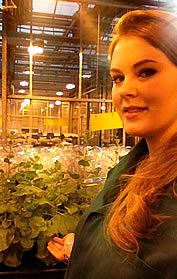
'I have really refined my thinking, learning to be much more critical and analytical not just in my studies but in all areas'
Stephanie Smith
Current role
I am currently in the 2nd year of my PhD in the Plant Sciences department, University of Nottingham. I work on cell signalling pathways involved in the development of roots, specifically lateral rooting. I started the project 10 days after my graduation from Birmingham and have so far published two reviews and I will be attending a conference in Oslo next month to discuss my research.
Outline the course you studied at the University of Birmingham and how it benefited you?
I can certainly say if it wasn’t for University of Birmingham I would not be here. I started on the Biosciences BSc course without any intention to focus on plants or even science as a career; by third year I had fallen in love with plant sciences- no doubt helped by some very passionate and inspiring members of the faculty. I switched to the 4 year MSci course to gain some extra practical experience and once I was fully convinced (midway through 4th year), I applied for my current PhD course. What I studied at Birmingham, as well as the wonderful opportunities my tutor helped me arrange in terms of internships and work experience not only secured my PhD, but are continuing to pay dividends 2 years after graduation.
How did you find your first year in Birmingham?
I was very nervous about starting at Birmingham and like most students I found the adjustment a little overwhelming to begin with. However, I could tell by a few weeks in I had definitely made the right choice. The university did a lot to make new students feel welcome and included and I got more involved with societies and sports – something I certainly never would have had the confidence to do before.
How did going to University as a whole benefit you?
The change in my confidence has been something all my friends and family have commented on. I felt that I never fully found my stride at A-levels and had rather modest expectations of what I was capable of when I started university – the day I graduated with a First Class honours MSci and the John Humphreys memorial prize for Botany was the proudest day of my life so far because I not just met, but exceeded what I had dreamt was ever possible when I started at university. I have really refined my thinking, learning to be much more critical and analytical not just in my studies but in all areas, and I made friends who I still keep in contact with now.
How did you find campus life?
I really liked the Edgbaston campus set up- it was close enough to the city centre (with excellent transport links) to never feel isolated, but the fact the campus was set a little way out from the city centre gave the campus a more friendly, student-orientated feel in my opinion. I also loved the greenery of the campus which I found very calming and the beautiful architecture which was inspiring – not something you would necessarily get on other city campuses..
How did you find living in Birmingham?
I enjoyed living in Birmingham very much. As someone who wouldn’t normally consider themselves a city girl, I felt Birmingham was big enough to be exciting but small enough to be friendly, and not overwhelming.
Did you join any student societies during your studies?
Yes – I joined BioSoc in first year and then acted as social secretary during second year before becoming joint president in 3rd and 4th year. This was really fun and I made many friends because of it. I also took part in different sports classes arranged by the Munrow Centre – I hated PE in school so was surprised to find that in the right environment being active can be fun!
Any tips to pass on to students thinking of coming here?
Everybody says it, but you really do get out of university what you put in. Don’t hole yourself up in your room – anyone can do that at any time and if you miss the opportunities available to you now, you will kick yourself when you are older. Try different activities, even things you never thought you’d see yourself doing. Make all the friends you can make and work hard, but play hard too – as any careers advisor will tell you, there’s more to securing your career than just good marks, so aim for balance!
What are your aspirations for the future?
After I graduate from my PhD I would love to work in scientific writing – perhaps as an editor for a scientific journal, or something of that nature. I also really enjoy helping to teach others (e.g. undergraduate project students we get in the lab) so that is something I would also keep in mind.